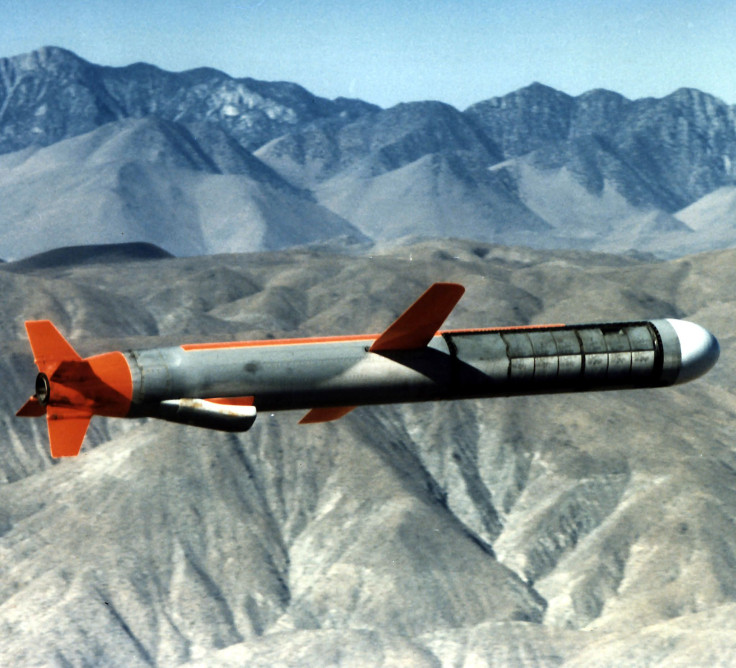US Defense Industry Winning In Syria And Iraq, With Long Campaign Expected

As the U.S.-led airstrikes in Iraq and Syria against ISIS continue, it remains unclear exactly how the complex mission against the Islamic State group will unfold. But what is evident already as strikes escalate is that U.S. defense companies are already cashing in.
Just days after the strikes in Syria began on Sept. 23, shares of Lockheed Martin, Northrop Grumman, Raytheon and General Dynamics all reached record prices.
"President [Barack] Obama has predicted that this air campaign could last for a long time, so that signals billions of dollars in additional sales of munitions, of spare parts and potentially also of aircraft," said defense consultant Loren Thompson.
But more than an increase in stock prices, the widening conflict, which started in Iraq in August before moving to Syria just one week ago, not only brings new orders to the defense industry, it can also help pay for new technology and even help stave off the closure of production lines and keep military hardware from being cut.
“One of the things that can help a new capability breakthrough is an operational stressor, like a major air campaign,” Mark Gunzinger, a retired Air Force colonel and former deputy assistant secretary of defense who is now at the Center for Strategic and Budgetary Assessments, told Fortune.
An example of that is the A-10 aircraft, which had been a candidate to be scrapped in Pentagon cuts before Congress controversially funded it for one more year. The low-flying, highly accurate strike aircraft will arrive in the Mideast theater of operations in October, and could survive well past its projected end date of 2016. While the aircraft is no longer produced, it still needs to be serviced, maintained and, crucially for defense companies, re-armed with munitions.
“As we ramp up our military muscle in the Mideast, there’s a sense that demand for military equipment and weaponry will likely rise,” said Jack Ablin, who oversees $66 billion including Northrop Grumman and Boeing shares as chief investment officer at Chicago-based BMO Private Bank. “To the extent we can shift away from relying on troops and rely more heavily on equipment -- that could present an opportunity,” he wrote in his emailed newsletter.
It’s munitions-making companies that stand to gain the most in the short term from this conflict. Lockheed Martin, for example, supplies the U.S. military with Hellfire missiles, which cost around $110,000 a piece and can be launched from a number of different platforms, including Predator drones. The U.S. Navy said it had fired 47 Raytheon-built Tomahawk missiles in the first night of strikes, costing around $74 million in total. Those supplies will have to be replenished. In its budget request for 2015 the Defense Department estimated that it would spend $325 million on procuring 196 missiles, which also incorporates research, development, testing and evaluation. But that was before the Syria airstrikes began.
The U.S. began its new offensive on Aug. 7 by striking ISIS targets in the North of Iraq under the legal auspices of the War on Terror. In the past week, the U.S. has expanded the campaign to ISIS positions in Syria, using a mix of Tomahawk missiles and F-22, F-15, F-16 and F-18 jets dropping precision-guided bombs and missiles, which are more expensive than unguided or "dumb" munitions.
Sequestration has crippled defense spending in the U.S., which is supposed to see $500 billion of cuts over ten years. As a result, defense companies have seen contracts from the Pentagon curtailed -- but in the newest Middle East conflict, the Americans aren't bombing, and spending, alone in a war that may cost as much as $10 billion. French and British warplanes are also hitting ISIS targets; Arab nations including Saudi Arabia, Jordan, and the United Arab Emirates are flying combat missions and dropping expensive "smart" bombs as well; and Iraq itself is the buyer of a host of top-notch American weapon systems, including dozens of F-16 fighters. All those new clients are helping push higher the share prices of U.S. defense giants.
© Copyright IBTimes 2024. All rights reserved.






















